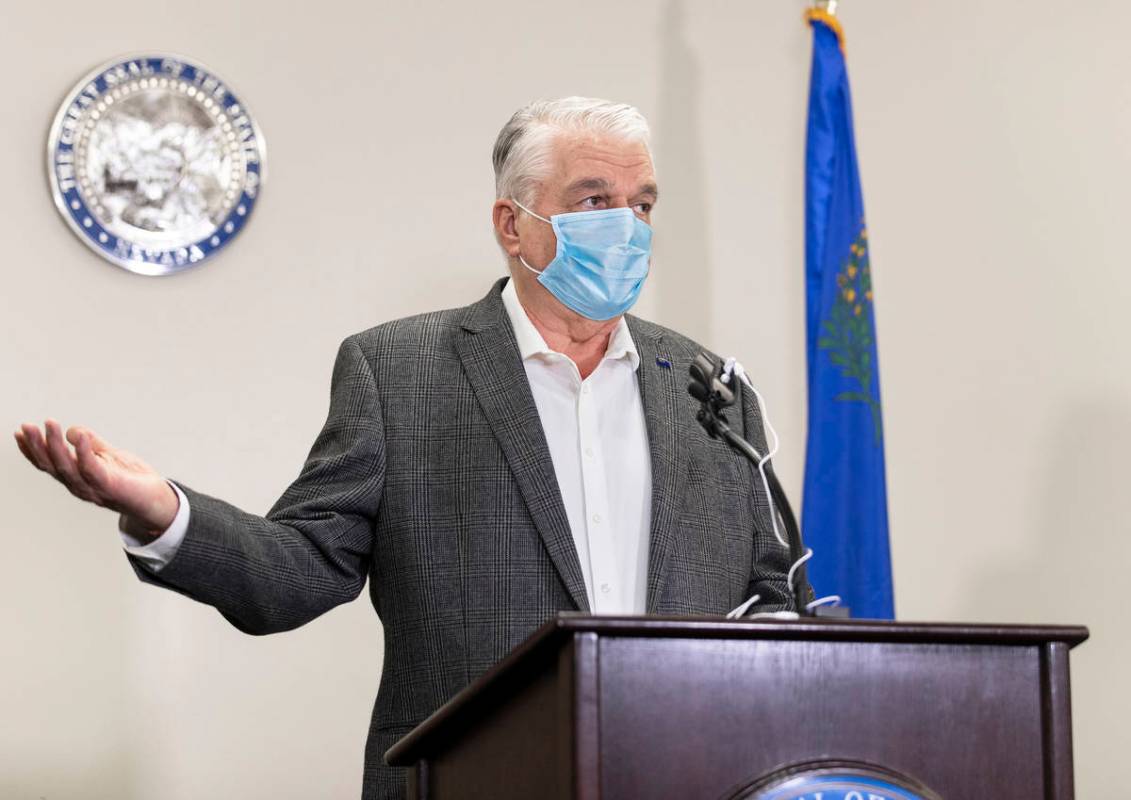
Gov. Steve Sisolak on Tuesday released the summary of his executive budget for the 2021-2023 biennium, a budget which highlights the pain wrought by the pandemic.
Sisolak is scheduled to deliver his 2021 State of the State Address at 6 p.m. Tuesday, but it has been prerecorded in light of the ongoing COVID-19 pandemic and will air on the governor’s YouTube page at that time.
“My executive budget for 2021-2023 recognizes the emergency we are experiencing as a result of the COVID-19 pandemic while also setting forth a clear plan to revitalize, innovate and grow Nevada’s economy,” Sisolak said. “I am committed to remaining flexible and working closely with the legislature in this unprecedented and evolving fiscal situation.
“Throughout this dynamic process, the priorities will remain the same: recovering from this crisis and creating jobs, educating our kids, promoting justice and equality and, most importantly now, protecting the health of our people.”
During the 31st special session in July of 2020, the Legislature had to make difficult cuts to the approved Fiscal Year 2021 budget based on summer revenue projections. Revised revenue projections in December 2020 were better than predicted. Ultimately, state revenues – while still severely affected by the economic crisis – never dropped as low as our worst expectations, and this budget reflects that inconsistent, if not positive, ending point.
The budget includes General Fund expenditures of $8,688,624,000, a reduction of $187,279,876 (2%) compared to the 2019-2020 biennium.
One-shot GF expenditures totaling $226 million in FY 21 because of greater than expected revenue projections and state reimbursements through federal funds, including, but not limited to, $25 million to fulfill the state’s commitment for construction of a state-of-the-art medical school at UNLV. The governor is also recommending that additional one-shot funding be dedicated for immediate small business assistance, which will be detailed in his State of the State.
There is $342 million in supplemental appropriations which the governor said are necessary to complete the current fiscal year. The largest of these appropriations is K-12 Education at $331 million over the biennium to fund state and local revenue shortfalls experienced as a result of mitigating and responding to COVID-19.
K-12 and Nevada System of Higher Education expenditures total $7 billion over the current biennium. K-12 expenditures for the biennium total $4.9 billion in state funds for a total of $6.63 billion including local funds, which represents a decrease of $30 million compared to the current biennium. NSHE expenditures for the biennium total $2 billion, which equates to a decrease of $80 million compared to the current biennium.
K-12 and higher education are expected to receive significant funding in the form of federal aid, but guidance is still forthcoming, and these dollars could not be included in this budget.
Phased implementation of the Pupil-Centered Funding Plan from Senate Bill 543 of the 2019 session uses only state revenues currently distributed through the Nevada Department of Education. This is the first step in implementing a pupil-based funding formula that is equitable and transparent.
Another $36.8 million in general obligation bonds are for funding an engineering and academic research building at UNLV.
The budget includes restoration of the 6% rate reduction for Medicaid and NV Check Up providers and restoration of the rate increase for Neonatal Intensive Care Units. Medicaid enrollment is approximately 18.7% higher than projected for the current biennium with additional growth of 2.2% projected through the 2021-2023 biennium.
The executive budget projects that approximately 778,000 individuals (approximately one in four Nevadans) will be enrolled in Medicaid by the end of the 2021-2023 biennium.
The budget also provides for increased General Funds of $3.14 million in funding for Autism Treatment and Assistance programs to address the projected waitlist, preservation of Department of Health and Human Services caseloads for Aging and Disability Services and total Capital Improvement Projects funding at $415 million, including an investment of $176 million in CIP for maintenance projects statewide.
The budget includes an investment of $75 million for future infrastructure and economic development projects proposed to be used to launch the State Infrastructure Bank to leverage outside capital and funds for the restoration of the Going Home Prepared program to assist inmates with supports for successful transition back into their communities.
There is $5 million for the Knowledge Fund to encourage creation and support for new business, business innovation and to leverage federal funds. State employee furloughs implemented effective Jan. 1, 2021 will not be continued in FY22 – 23.
The budget also calls for Expanded Public Employees’ Benefits Program coverage options to include a new low-deductible copay-based option and stable premiums for the upcoming plan year.